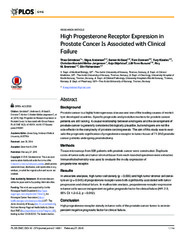| dc.contributor.author | Grindstad, Thea | |
| dc.contributor.author | Andersen, Sigve | |
| dc.contributor.author | Al-Saad, Samer | |
| dc.contributor.author | Dønnem, Tom | |
| dc.contributor.author | Kiselev, Yury | |
| dc.contributor.author | Melbø-Jørgensen, Christian | |
| dc.contributor.author | Skjefstad, Kaja | |
| dc.contributor.author | Busund, Lill-Tove | |
| dc.contributor.author | Bremnes, Roy M. | |
| dc.contributor.author | Richardsen, Elin | |
| dc.date.accessioned | 2016-03-04T11:19:31Z | |
| dc.date.available | 2016-03-04T11:19:31Z | |
| dc.date.issued | 2015-02-27 | |
| dc.description.abstract | Background
Prostate cancer is a highly heterogeneous disease and one of the leading causes of mortality
in developed countries. Specific prognostic and predictive markers for prostate cancer
patients are still lacking. A causal relationship between androgens and the development of
prostate cancer is generally considered biologically plausible, but androgens are not the
sole effector in the complexity of prostate carcinogenesis. The aim of this study was to evaluate
the prognostic significance of progesterone receptor in tumor tissue of T1-3N0 prostate
cancer patients undergoing prostatectomy.
<p>Methods
Tissue microarrays from 535 patients with prostate cancer were constructed. Duplicate
cores of tumor cells and tumor stromal tissue from each resected specimen were extracted.
Immunohistochemistry was used to evaluate the in-situ expression of
progesterone receptor.
<p>Results
In univariate analyses, high tumor cell density (p = 0.006) and high tumor stromal cell density
level (p = 0.045) of progesterone receptor were both significantly associated with tumor
progression and clinical failure. In multivariate analysis, progesterone receptor expression
in tumor cells was an independent negative prognostic factor for clinical failure (HR: 2.5,
95% CI: 1.2–5.2, p = 0.012).
<p>Conclusion
High progesterone receptor density in tumor cells of the prostate cancer tumor is an independent
negative prognostic factor for clinical failure. | en_US |
| dc.identifier.citation | PLoS ONE 2015, 10:e0116691(2) | en_US |
| dc.identifier.cristinID | FRIDAID 1232737 | |
| dc.identifier.doi | 10.1371/journal.pone.0116691 | |
| dc.identifier.issn | 1932-6203 | |
| dc.identifier.uri | https://hdl.handle.net/10037/8690 | |
| dc.identifier.urn | URN:NBN:no-uit_munin_8228 | |
| dc.language.iso | eng | en_US |
| dc.publisher | Public Library of Science | en_US |
| dc.rights.accessRights | openAccess | |
| dc.subject | VDP::Medisinske Fag: 700::Klinisk medisinske fag: 750::Onkologi: 762 | en_US |
| dc.subject | VDP::Medical disciplines: 700::Clinical medical disciplines: 750::Oncology: 762 | en_US |
| dc.title | High progesterone receptor expression in prostate cancer is associated with clinical failure | en_US |
| dc.type | Journal article | en_US |
| dc.type | Tidsskriftartikkel | en_US |
| dc.type | Peer reviewed | en_US |


 English
English norsk
norsk